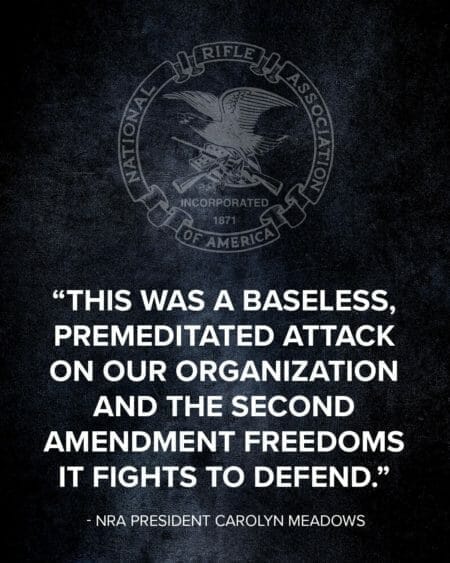Could NRA Members Intervene To Stop NY Suit To Dissolve The NRA?
Forum Information
You will earn 1.5 pts. per new post (reply) in this forum.
**Registered members may reply to any topic in this forum**
You will earn 1.5 pts. per new post (reply) in this forum.
**Registered members may reply to any topic in this forum**
-
NHGF [Feed]

- Posts: 17274
- Joined: Mon Oct 30, 2017 5:16 pm
- Contact:
- Status: Offline
 The question here is, will NRA management's legal efforts defending themselves turn out to be in the best interests of the members? (National Rifle Association/Facebook)U.S.A. – -(Ammoland.com)- As widely reported, New York Attorney General Letitia James filed suit to dissolve the NRA filed on August 6. The suit claims that NRA executives Wayne LaPierre, Wilson Phillips, Joshua Powell, and John Frazer used their positions for personal gain and otherwise misspent or misused NRA funds and resources. The AG claims that she can bring the action because the NRA was incorporated in New York as a non-profit corporation. While an eventual outcome of dissolving the association is thought by some legal analysts to be an overreach, AG James doesn't have to shut them down to have a devastating effect: “This diverts NRA focus and resources away from the November election at a time when both are most needed if the Democrat agenda against the right to keep and bear arms is to be effectively politically opposed.” We’re already seeing the effects of that. “NRA’s political spending plunges as lawsuits, controversies hit,” Fox News reports. “The NRA’s most recent filings say it has spent less than $1 million in the 2020 cycle.” With the Biden/Harris threat growing, this could not have come at a worse time for gun owners. However, an Alabama lawyer who is also an NRA Life Member has suggested a legal procedure that could be used both to preserve the NRA's existence and to install new leadership if the New York AG proves her claims against the NRA executives. George Douglas raised the alarm for the NRA's general membership in an “Action Memorandum”, pointing out that the individual NRA executive defendants had “obvious and irreconcilable” conflicts of interest: “Regardless of whether the [attorney general's] claims are true, the individuals will be likely to put their own interests ahead of the corporation's, and therefore likely to agree [to] a settlement that absolves them of personal liability by using the corporation's assets to buy off the plaintiff.” Douglas noted three possibilities if the suit goes forward as it is presently filed “and all of them are bad for the NRA and its membership.” The first two possibilities are that either the New York AG or the NRA would win flat out, but Douglas said both of these are unlikely. He said the most probable outcome would be that “The AG and the LaPierre defendants will cook up a settlement that allows both sides to declare victory but in actuality results in further damage to the NRA with both a diminution of its assets and a restriction on its activities while leaving the LaPierre group in control.” Douglas urged NRA members to intervene in the New York suit, both individually and as state or local associations. He explained that intervention is a legal procedure allowing persons who aren't parties to a suit to “intervene” and participate in the litigation “when they would be adversely affected by a judgment but aren't adequately represented by the original parties.” He suggested five “basic claims for intervention”:
The question here is, will NRA management's legal efforts defending themselves turn out to be in the best interests of the members? (National Rifle Association/Facebook)U.S.A. – -(Ammoland.com)- As widely reported, New York Attorney General Letitia James filed suit to dissolve the NRA filed on August 6. The suit claims that NRA executives Wayne LaPierre, Wilson Phillips, Joshua Powell, and John Frazer used their positions for personal gain and otherwise misspent or misused NRA funds and resources. The AG claims that she can bring the action because the NRA was incorporated in New York as a non-profit corporation. While an eventual outcome of dissolving the association is thought by some legal analysts to be an overreach, AG James doesn't have to shut them down to have a devastating effect: “This diverts NRA focus and resources away from the November election at a time when both are most needed if the Democrat agenda against the right to keep and bear arms is to be effectively politically opposed.” We’re already seeing the effects of that. “NRA’s political spending plunges as lawsuits, controversies hit,” Fox News reports. “The NRA’s most recent filings say it has spent less than $1 million in the 2020 cycle.” With the Biden/Harris threat growing, this could not have come at a worse time for gun owners. However, an Alabama lawyer who is also an NRA Life Member has suggested a legal procedure that could be used both to preserve the NRA's existence and to install new leadership if the New York AG proves her claims against the NRA executives. George Douglas raised the alarm for the NRA's general membership in an “Action Memorandum”, pointing out that the individual NRA executive defendants had “obvious and irreconcilable” conflicts of interest: “Regardless of whether the [attorney general's] claims are true, the individuals will be likely to put their own interests ahead of the corporation's, and therefore likely to agree [to] a settlement that absolves them of personal liability by using the corporation's assets to buy off the plaintiff.” Douglas noted three possibilities if the suit goes forward as it is presently filed “and all of them are bad for the NRA and its membership.” The first two possibilities are that either the New York AG or the NRA would win flat out, but Douglas said both of these are unlikely. He said the most probable outcome would be that “The AG and the LaPierre defendants will cook up a settlement that allows both sides to declare victory but in actuality results in further damage to the NRA with both a diminution of its assets and a restriction on its activities while leaving the LaPierre group in control.” Douglas urged NRA members to intervene in the New York suit, both individually and as state or local associations. He explained that intervention is a legal procedure allowing persons who aren't parties to a suit to “intervene” and participate in the litigation “when they would be adversely affected by a judgment but aren't adequately represented by the original parties.” He suggested five “basic claims for intervention”: - That the intervening NRA members will be adversely affected by a judgment in the action, and that they are not (and cannot) be adequately represented by either the NYAG or the individual defendants and their counsel due to their inherent conflicts of interest.
- That the NYAG does not have the legal authority to assert her claims against the NRA based on the alleged wrongs of its individual leadership, and that those claims (even if true) can only be properly brought by the NRA members.
- That the proper remedy for those wrongs, if they are proven, is not the dissolution of the NRA but recovery of the misspent funds from the individuals for the NRA as an entity, not for the NYAG or the State.
- That because of the inherent conflicts of interest between the individual defendants and the NRA as an entity, the NRA must have separate counsel who are not chosen by the individual defendants.
- That both the NYAG and the intervenors should therefore be allowed to proceed with proving the allegations against the individual defendants, and that if those are proven then the individual defendants should be removed from their positions and new leadership chosen by the NRA members should be put in place.

David Codrea is the winner of multiple journalist awards for investigating/defending the RKBA and a long-time gun owner rights advocate who defiantly challenges the folly of citizen disarmament. He blogs at “The War on Guns: Notes from the Resistance,” is a regularly featured contributor to Firearms News, and posts on Twitter: @dcodrea and Facebook.